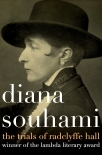The Trials of Radclyffe Hall by Diana Souhami (surface ebook reader .TXT) 📗

- Author: Diana Souhami
Book online «The Trials of Radclyffe Hall by Diana Souhami (surface ebook reader .TXT) 📗». Author Diana Souhami
Lovat Dickson told her that the right biographer would be found. He suggested A. L. Rowse. Una bought a volume of his poems wanting ‘to judge of his mind by the quality of his verse’. The idea was not pursued. She asked Lovat Dickson to write it himself and offered to give him all her papers. He said he was too busy to consider it for some years. Una accepted this as Radclyffe Hall’s and Saint Thomas’s will.
In February 1945 Mrs Visetti had a stroke. She was ninety-four. Dr Horsford asked Una for £14 for a radio for her as she was bedridden, and for £50 to pay his fees. ‘The answer of course is in the negative. It is only yet another dodge by the wily old devil to get extra money.’
The following month Una heard from Harold Rubinstein that the wily old devil was dying. Dr Horsford again asked if Una would give financial help to cover nursing and chemist’s bills:
I certainly don’t give Mrs Horsford or her offensive husband or anyone a vague permission to spend my money (yours) as they may choose. If they let me know definitely of something she needs I will consider it. If I send money vaguely it will probably be spent on some foolishness & I ain’t doing it. I know they have something in hand and £16 goes to her bank in ten days time anyway.
Mrs Visetti died three weeks later on 14 April. ‘I have done for your mother exactly what you did yourself,’ Una wrote in a Letter to John, ‘and left her in the circumstances she chose and preferred and that is that.’ Mrs Visetti was, Una said, ‘crudely and terribly unworthy of having given birth to Radclyffe Hall’. She supposed that mother and daughter would not meet again because not even God in His infinite mercy would put them on the same plane.
The notice of death in The Times described Mrs Visetti only as Alberto’s widow and made no mention of Radclyffe Hall. She was to be buried at Brookwood Cemetery in the same grave as Alberto. Una was now the freeholder of the grave. She supposed they would have to apply to her to open it. Permission would not be forthcoming until she received the portrait of Radclyffe Hall by Katinka Amyat.
The portrait was sent to her. Una asked Tony Atwood at Smallhythe to paint out the blonde curls so that it looked like ‘a little boy’s face’. It was one more lie. Thus doctored, she intended to include the picture in The Life and Death of Radclyffe Hall when the time came for publication. (The illustrations she chose for her book were only of herself and John. There was none of Mabel Batten or Evguenia. All those of John made her look like a man.)
Mrs Visetti’s solicitors then sent a letter asking Una to pay what was owing on her estate for funeral expenses and doctors’ fees – nearly £300 – or to return the Amyat portrait. Una thumbed her nose. Mrs Visetti’s debts were nothing to do with her. Surrender of the portrait was a condition of the covenant she had made when granting her an income.
Una let slip in her diary that John had wanted Evguenia to have an annuity ‘on a larger scale than I intend’. For a while Evguenia worked as a translator with Reuters. Una wanted to know her salary and all expenses. When Evguenia lost the job Una saw it as a ruse to wheedle money. Evguenia, she said, was determined not to take and keep a routine job with decent hours. She pointed out to her how hard Andrea worked and told her it cost a great deal in tax to give her any allowance. Through a solicitor Evguenia forwarded bills from doctors and dentists. Una accused her of crooked accounting. ‘I will not have her getting away with deliberate dishonesty in addition to her chronic moral dishonesty.’ She also accused her of keeping £25 John had loaned her in case of emergencies. She called on her without warning, found her living in one ‘very very dilapidated room’ and thought it significant that there were no photographs of John in sight.
Evguenia was desolate when at the war’s end she was refused a resident’s visa for Paris. All her furniture was in store there and she could not afford to pay to get it to England. Her ‘nest egg’ of savings – some thousands of pounds – had been taken by the Gestapo. In her Letters to John, Una wrote, ‘That is a result of her putting it in a bank there on her own instead of telling you all about it and letting you bank it safely.’
Evguenia grew tired of the hoops she had to jump through to get a pittance wage from Una, the way Una cavilled at everything she did, her vitriol and accusations. She wrote to her that none of it was worth the trouble. She got a job as a nurse with the United States Army in Germany. Before she left London, she met Una and had a showdown. She asked for a month’s allowance in advance to help with moving country. Una refused. Evguenia accused her of cheating, of not keeping to the spirit of John’s will and of exerting influence over John when she was dying.
‘I hung on to my temper like grim death,’ Una wrote, ‘resisting an almost irresistible impulse to tell her to get out. I told her that it was entirely on my own initiative that I paid her any allowance, that I had no legal obligation of any kind, that she must reflect on this and not make





Comments (0)